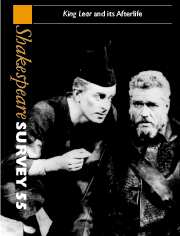Book contents
- Frontmatter
- King Lear: A Retrospect, 1980–2000
- How Shakespeare Knew King Leir
- Contracts of Love and Affection: Lear, Old Age, and Kingship
- Headgear as a Paralinguistic Signifier in King Lear
- What becomes of the broken-hearted: King Lear and the Dissociation of Sensibility
- Lear’s Afterlife
- Songs of Madness: The Lyric Afterlife of Shakespeare’s Poor Tom
- Secularizing King Lear: Shakespeare, Tate, and the Sacred
- ‘Look on her, look’: The Apotheosis of Cordelia
- Jacob Gordin’s Mirele Efros: King Lear as Jewish Mother
- ‘How fine a play was Mrs Lear’: The Case for Gordon Bottomley’s King Lear's Wife
- Some Lears
- King Lear and Endgame
- Shakespeare in Pain: Edward Bond’s Lear and the Ghosts of History
- ‘Think about Shakespeare’: King Lear on Pacific Cliffs
- Actors, Editors, and the Annotation of Shakespearian Playscripts
- Titus Andronicus: The Classical Presence
- Julius Caesar, Machiavelli, and the Uses of History
- Scepticism and Theatre in Macbeth
- Revels End, and the Gentle Body Starts
- ‘Taking just care of the impression’: Editorial Intervention in Shakespeare's Fourth Folio, 1685
- ‘A world elsewhere’: Shakespeare in South Africa
- Shakespeare Performances in England, 2001
- Professional Shakespeare Productions in the British Isles January–December 2000
- The Year's Contributions to Shakespearian Study 1 Critical Studies
- 2 Shakespeare’s Life, Times and Stage
- 3 Editions and Textual Studies (1) and (2)
- Books Received
- Index
Julius Caesar, Machiavelli, and the Uses of History
Published online by Cambridge University Press: 28 March 2007
- Frontmatter
- King Lear: A Retrospect, 1980–2000
- How Shakespeare Knew King Leir
- Contracts of Love and Affection: Lear, Old Age, and Kingship
- Headgear as a Paralinguistic Signifier in King Lear
- What becomes of the broken-hearted: King Lear and the Dissociation of Sensibility
- Lear’s Afterlife
- Songs of Madness: The Lyric Afterlife of Shakespeare’s Poor Tom
- Secularizing King Lear: Shakespeare, Tate, and the Sacred
- ‘Look on her, look’: The Apotheosis of Cordelia
- Jacob Gordin’s Mirele Efros: King Lear as Jewish Mother
- ‘How fine a play was Mrs Lear’: The Case for Gordon Bottomley’s King Lear's Wife
- Some Lears
- King Lear and Endgame
- Shakespeare in Pain: Edward Bond’s Lear and the Ghosts of History
- ‘Think about Shakespeare’: King Lear on Pacific Cliffs
- Actors, Editors, and the Annotation of Shakespearian Playscripts
- Titus Andronicus: The Classical Presence
- Julius Caesar, Machiavelli, and the Uses of History
- Scepticism and Theatre in Macbeth
- Revels End, and the Gentle Body Starts
- ‘Taking just care of the impression’: Editorial Intervention in Shakespeare's Fourth Folio, 1685
- ‘A world elsewhere’: Shakespeare in South Africa
- Shakespeare Performances in England, 2001
- Professional Shakespeare Productions in the British Isles January–December 2000
- The Year's Contributions to Shakespearian Study 1 Critical Studies
- 2 Shakespeare’s Life, Times and Stage
- 3 Editions and Textual Studies (1) and (2)
- Books Received
- Index
Summary
Why did Shakespeare use stories from the Graeco-Roman world? Machiavelli went to Roman history because he believed that Livy’s narratives provided political lessons that could be applied to the modern world. It has traditionally been supposed that Shakespeare dramatized stories from Plutarch and other historians for similar reasons. For the new ‘politic’ historiographers, and, it used to be generally assumed, for Shakespeare as well, the importance of ancient history lay in its ability to illuminate modern events. In recent years these assumptions have been challenged by materialist and postmodern scholars who have argued that the supposedly essentialist view of humanity underpinning this rational historiography is an invention of pre-theoretical literary scholarship. Shakespeare, it is claimed, was a precursor of our own disillusioned postmodern view of ‘man’ and history. Julius Caesar certainly suggests that Shakespeare took a sceptical view of politics. But evidence in the play in support of the claim that he shared the anti-humanist theories of the postmodern historiographers he is said to anticipate is less strong.
- Type
- Chapter
- Information
- Shakespeare SurveyAn Annual Survey of Shakespeare Studies and Production, pp. 209 - 218Publisher: Cambridge University PressPrint publication year: 2002
- 1
- Cited by



